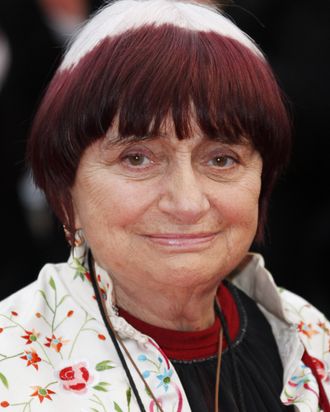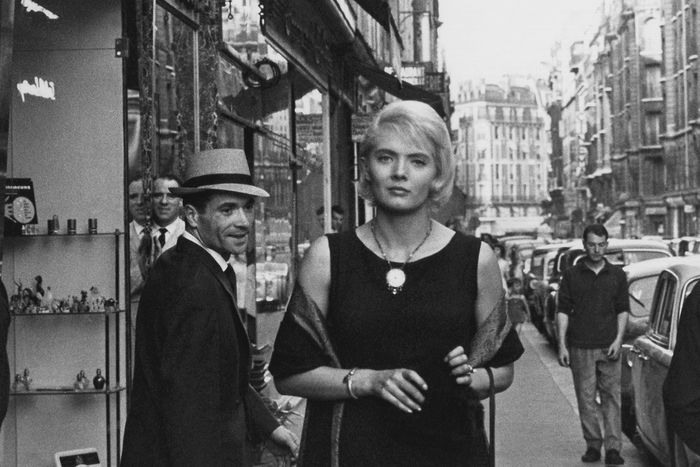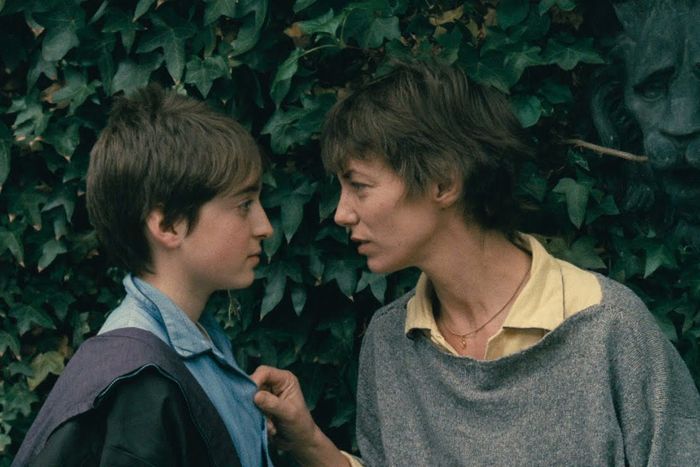
Agnès Varda, who passed away today at the age of 90, represented the rare feminine voice within the French New Wave movement, working alongside the likes of her male peers Jean-Luc Godard and François Truffaut. She was powerful both behind and in front of the camera — she was a regular fixture in her own documentaries, with an unmistakable, inimitable two-toned bowl cut and cutting sense of humor and intellectualism. Varda’s filmography stretches from her 1955 debut La Pointe Courte all the way to her 2017 Oscar-nominated documentary Faces Places. In between are many gems to be discovered and revisited — lenses through which French cinema found its female gaze. In her honor, we’ve assembled a list of essential Varda viewing to you immerse yourself in this weekend.
Cléo From 5 to 7 (1962)
Varda’s second film is perhaps her most famous: an unraveling of anxieties and vanities as a pop star by the name Cléo wanders the streets of Paris while she awaits a potential cancer diagnosis. She tries on hats and entertains lovers, and the mundanity of her self-centered lifestyle — captured in a 90-minute snapshot — reveals existential dread and the demands of beauty and celebrity. Also worthy of note are the Jean-Luc Godard and Anna Karina cameos and the moving score from the late, great Michel Legrand (who passed away earlier this year).
Le Bonheur (1965)
Largely recognized as Varda’s most beautiful film — colored by sun-kissed skin, grassy greens, and vibrant outfits to create an Impressionist painting come to life — this 1965 drama aesthetically captures the film’s title (which translates to “Happiness”). The story is, of course, a bit more complicated than that, rendering its palette ironic. The film’s patriarch has a beautiful wife and kids at home, but falls for another woman and begins an affair. Varda has such an unconventional way of commenting on infidelity that at a glance, this film may seem “anti-feminist” — and it was even called that. But Varda infuses her cutting commentary as subtext.
Vagabond (1984)
Beginning with the death of the protagonist, Vagabond is a harrowing, confrontational watch starring Sandrine Bonnaire — one of the most charismatic fixtures of French cinema — as a homeless drifter named Mona. Mona is decidedly unfeminine, rebellious, and impossible to pin down. Varda has often used non-actors for realist effect, and here, the director inserts herself to narrate and interview supporting characters to create a bleak world impossible to look away from. Varda won a Golden Lion at the 1985 Venice Film Festival and Bonnaire took home a Best Actress César.
The Gleaners and I (2000)
This film was not the first of Varda’s inspired by a painting (see Le Bonheur above). This movie takes Jean-François Millet’s 1857 painting The Gleaners — a dust-hued depiction of rural working-class women — as influence for a story that pushes Varda on her own self-actualizing journey about France and the “gleaners” who do forgotten work deemed unimportant by most of society. This documentary is not only personal (as Varda bridges the gap between herself and those who scavenge fields and garbages) but also contains an explicit social critique bent present throughout her filmography.
Kung Fu Master! and Jane B. Par Agnès V. (1988)
These two Jane Birkin–starring films are often grouped together as a double feature. The narrative feature, Kung Fu Master, is a film that is so very French: a middle-aged housewife (Birkin) falls for her daughter’s teen friend, the 14-year-old Julien (played by Varda’s own son, Mathieu Demy). Birkin’s real daughters Charlotte Gainsbourg and Lou Doillon play her fictional offspring. The shocking premise lends itself to some unexpectedly touching moments, including meta commentary of the aging ’60s It Girl. It’s this sensibility that carries Birkin’s performance in the hybrid documentary Jane B. Par Agnès V., which allowed Birkin to slip into various fantastical roles while articulating her apprehension about easing into her 40s.





